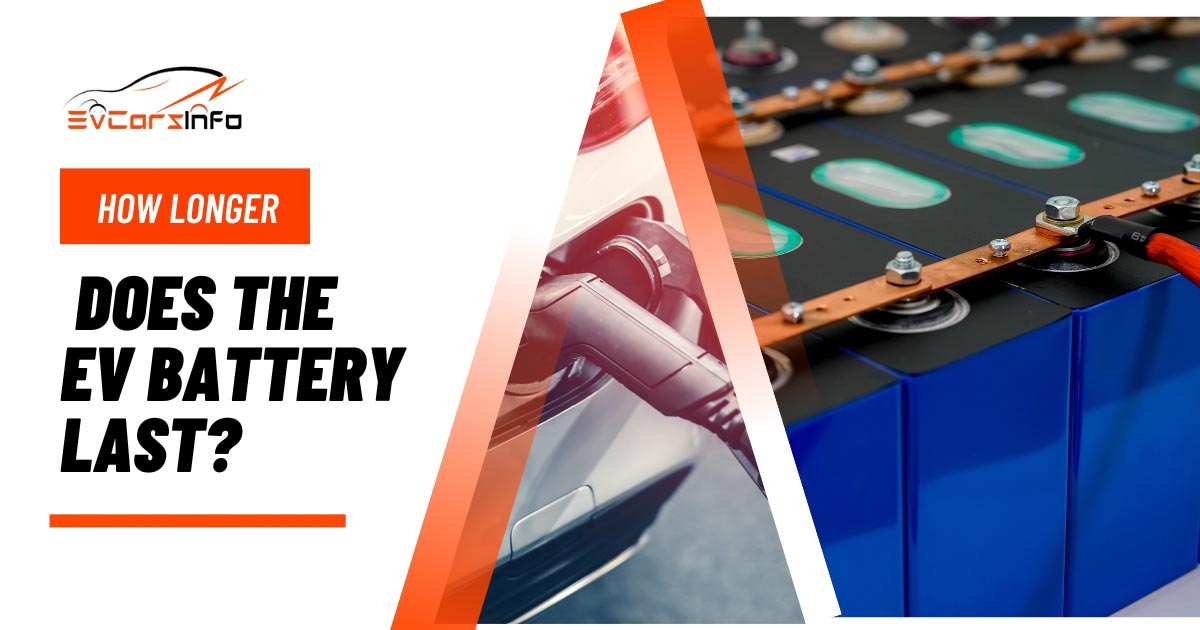

How Longer does the EV Battery Last
How longer does the EV battery last is a common question among people considering making the move as electric cars as well as other electric cars (EVs) gain popularity. While the lifespan of batteries varies depending on the manufacturer and their age, you can generally anticipate that new batteries will match and frequently surpass the durability of drivetrain parts in internal combustion engine vehicles.
Rechargeable lithium-ion batteries, which have a higher energy density than rechargeable nickel-cadmium batteries or the lead-acid batteries used in internal combustion engines, power electric automobiles. Since of their high energy density, lithium-ion batteries are perfect for electric cars because they can generate more power relative to their size.
EVs are significantly more straightforward and efficient because they are only powered by batteries. As the price of lithium-ion batteries has dropped by 97% in the past 30 years, experts predict that EV production will soon be as affordable as ICE vehicles.
Can EV Batteries Degrade?
The key factors that contribute to EV battery deterioration are temperature, cycles, and time. How longer does the EV battery last is depends on these factors. The lifespan about an EV battery is greatly influenced by storage and operation temperatures; generally speaking, warmer climes have a negative impact. The battery gradually loses its full capability as it undergoes charge cycles—discharged while driving and recharged when plugged in. Even if you don’t use or charge your EV battery, it won’t last indefinitely due to calendar deterioration, which is the battery’s gradual loss of life.
EV batteries have sophisticated battery management systems (BMS), which control how the batteries is charged and discharged in order to increase their lifespan as opposed to the lithium-ion batteries present in a phone or laptop. The EV battery is therefore more likely to degrade due to temperature or time.
Batteries in electric cars function
An electric vehicle obtains its power straight from a large pack of batteries, as opposed to internal combustion-engined automobiles, which get their energy from burning gasoline or fuel. These resemble an enlarged variant of lithium-ion (Li-ion) batteries in your smartphone; however, electric vehicles (EVs) employ packs comprised of thousands of single Li-ion cells that cooperate to power the vehicle. Electricity is utilized to modify the batteries’ chemical composition while the automobile is charging. When the car is moving, these alterations are reversed to produce power.
The wheels are driven by electric motors that are connected to the battery. When you step on the gas, the automobile immediately supplies the motor with power, which progressively uses up the energy stored by the batteries. When you release the accelerator, the automobile starts to slow down by transforming its forward momentum back into electricity. This happens more powerfully if you apply the brakes. Electric motors also function as generators. By recovering energy that would normally be wasted while braking, regenerative braking increases battery life and extends the travel distance of an automobile.
EV Battery Lifetime
So the issue still stands: How longer does the EV battery last Fortunately for customers, California increases the battery warranty from the federal requirement of 8 years / 100,000 miles (ca. 160,934 km) to 10 years / 150,000 miles (ca. 241,402 km).
Companies may produce larger batteries with higher energy potential as EV battery packs get more affordable to produce, which in turn enhances their mile range. Additionally, the more advanced technology lessens battery deterioration, which keeps the full capability of the battery closer to that of a brand-new battery over time. And because the mileage range of contemporary batteries has already improved significantly, even as they age, they will continue to have a larger mileage range than batteries from only a few years ago. Since a lithium-ion battery is composed of several individual cells, it seldom needs to be changed in its whole as it matures. Instead, merely replacing dead cells will save you money.
FAQ:
Is it possible to charge an electric vehicle at home?
You can, in fact, charge that at home. You can use a Type 1 AC chargers to charge out of an AC outlet, however the 3 kWh charge rate is too sluggish. The quicker Type 2 and wallbox charger is typically installed in homes by auto manufacturers. In addition to these, there are more faster chargers.
How long does a charging session last?
An electric automobile may charge to 80% of its capacity in anywhere between 60 minutes and 8–9 hours, depending on the type, size, and speed of the charging station. Rapid chargers, on the other hand, let you to cut this time down to 30 to 40 minutes.
See More:
10 Best EV Car Under 30k | Top Ten Used Electric Cars Under $30,000
Rebate For Electric Car in California
Facebook
Twitter
LinkedIn
Pinterest
Tumblr
Categories
- Abarth (1)
- Acura (1)
- Apple (1)
- Audi (5)
- BMW (3)
- Buick (1)
- Buying Guide (15)
- BYD (2)
- Cadillac (2)
- Car News (41)
- Car Reviews (1)
- Chevrolet (2)
- Citroen (2)
- CUPRA (1)
- EV Basic Info (14)
- Explore EVs (121)
- Fiat (1)
- Fisker (4)
- Ford (3)
- Genesis (3)
- GMC (3)
- Honda (4)
- Huawei (1)
- Hyundai (6)
- Jeep (2)
- Kia (7)
- Lexus (1)
- Lotus (3)
- Lucid Air (2)
- Maintenance Tips (2)
- Maserati (1)
- Mercedes (4)
- Mini (1)
- NIO (4)
- Nissan (2)
- OPEL (1)
- Peugeot (2)
- Polestar (6)
- Porsche (3)
- Ram (1)
- Renault (1)
- Rivian (6)
- Rolls-Royce (1)
- Scout (1)
- Sono (1)
- Subaru (1)
- Tata (1)
- Tesla (6)
- Toyota (3)
- VinFast (5)
- Volkswagen (4)
- Volvo (5)
- Xiaomi (1)
Recent Posts
Related Info
Popular Tags
24 Hour Series
2024 Acura ZDX EV
2024 Chevrolet Silverado EV
2024 Ford F-150 Lightning
2024 Genesis Electrified GV70
2024 GMC Hummer EV Pickup
2024 GMC Hummer EV SUV
2024 Honda Prologue EV
2024 Hyundai Ioniq 6
2024 Kia EV9
2024 Kia Niro EV
2024 Lexus RZ
2024 Nissan Ariya Nismo electric SUV
2024 Polestar 2
2024 Rivian R1S
2024 Rivian R1T
2024 Subaru Solterra EV SUV
2024 Toyota bZ4X
2024 Toyota Mirai
2024 Toyota RAV4 Prime
2024 Volkswagen ID 4
2025 Jeep Wagoneer S
2025 Porsche Taycan
2025 Volvo EX90
Audi Wins 2024 Dakar Rally
BYD Qin L Exposed
Citroen e-C3 2025
Electric Vehicles in Recession
Federal Government Orders recall
GMC Sierra EV Denali Edition 1
Huawei Alpha T5
Hyundai Ioniq 5 2024
kia
Kia Niro
mi su7 price
Music Platform Melon
Porsche Macan EV
Renault 5 E-Tech EV In 2024
Scout Motors EV
Sell Used Electric
Tesla
Tesla Model Y 2024
Tesla Recalls 1.62 M Vehicles
Toyota
Xiaomi SU7
Related posts

January 2, 2024
California Governor Gavin Newsom’s executive order California Electric Car Laws in 2024, which forbade the sale of ICE...

Federal Tax Credit for Electric Vehicles or 2024 EV Tax Credit
OmarBinSofi
December 30, 2023
Contents hide 1 Introduction. 2 Amount of Federal Tax Credit for Electric Vehicles or 2024 EV Tax Credit...

Lithium Batteries: How Long is the Best Life Span of Electric Vehicles?
OmarBinSofi
December 18, 2023
Contents hide 1 Overview 2 The cycle life of Lithium Batteries Overview How long can a set of...

How Many Years Do Electric Vehicle Lead-Acid Batteries Life?
OmarBinSofi
December 16, 2023
How many years do electric vehicle lead-acid batteries last? What causes Lead-Acid Batteries Life to be shortened? The...
EvCarsInfo provides all latest, popular, upcoming, Electric Vehicles News, Reviews and information.We are mainly focused on the Buying Guide, Car News, Car Reviews, Upcoming Cars, ETC.






